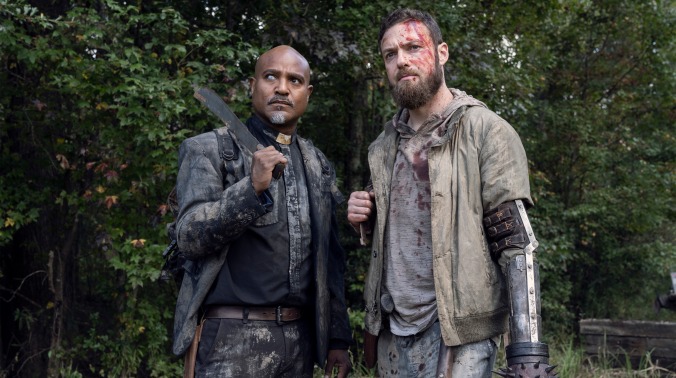Damn, The Walking Dead just pulled off a bleak surprise


Well, that was bracing. For most of “One More,” it seems as though we’re going to just be doing another gloss on the whole “Are people still worth saving? Is there still beauty in the world?” shtick The Walking Dead has done a hundred times before. (That might not even be hyperbole at this point.) Guest star Robert Patrick is there, playing a menacing guy who has taken Gabriel and Aaron prisoner, and is forcing them to play Russian roulette, with one caveat: They can point the gun at themselves or the other man, and pull the trigger. He wants them to keep going until one of the two is dead, assuming one will eventually shoot the other, out of some misguided idea that this will prove a point about how there’s only bad folks left, or whatever. But Gabriel and Aaron refuse to give in. “You weren’t always like this; none of us were,” one tells the man, kindly. “We’re good people!” the other insists, swearing that if he’ll just put the gun down, they can take him to join their community, and he’ll see that there’s still good in the world. They each point the gun at their own heads and pull the trigger, over and over, until finally, right before Aaron kills himself, the man puts a stop to it. Patrick’s mysterious loner drops the gun, and unties Aaron. “Meyers. My name is Meyers,” he says. Our duo just got a new traveling companion, and the community will meet a new face.
And then.
What’s shocking about Gabriel’s brutal murder of Meyers—at the very moment of peace being established, the priest slams Aaron’s mace into the back of the guy’s head, killing him instantly and splattering blood all over his friend—isn’t just that it’s the man of God doing the killing. After all, we’ve seen Gabriel kill before, most notably in “The World Before,” when he murdered Dante after the doctor turned out to be a Whisper secret agent who killed Siddiq, and almost killed Rosita. But that could still be explained via personal motivation: Siddiq wasn’t just a friend, he was the co-parent to Gabriel’s daughter. It was understandable that Gabriel might lose his cool and give in to a desire for revenge.
No, what made this such a welcome and surprising twist was how it flies in the face of everything the episode seemed to be about, up until then. Most of the time in recent seasons, The Walking Dead plays like a show that has already said everything it has to say, and now we’re just watching events play out until next season’s endgame. “One More” unfolds like a typical installment, albeit narrowed down to just two characters. Gabriel and Aaron are hunting down places that Maggie had marked on a map as potentially containing food or other goods, checking them off one by one on their two-week journey. Each location is ultimately revealed to be yet another hollowed-out waste of time, from the burned-down remains they explore in the opening minutes to the store where Gabriel sees the bodies of once-desperate survivors on the roof, fruitlessly looking for rescue with a giant “Save Us” painted on the ground. So when the two stumble upon a boar and a bottle of whiskey, they—and we—settle in for a night of bonding, as they play cards and drunkenly debate whether or not humanity is good or evil. And yes, Gabriel confesses to a pessimistic view of humanity, one we’ve seen him reveal more and more the past season. “Evil people aren’t the exception to the rule,” he says, and it looks as though the arrival of Meyers is perfectly timed to once again make the show’s ongoing case that good people are where you find them, and there’s always another chance to be virtuous, to help people, to do the right thing, blah blah blah.
And for most of the encounter, that’s exactly how it plays out. Marquand and Gilliam do good work here, making what could’ve been a wheezy and tired series of platitudes sound vital and earnest (maybe it helps, literally having a gun pointed at your head, to really sell such material). This is an arc we’ve seen the show do repeatedly, for better and worse, and while it wasn’t the most exciting version of it, the two actors have good chemistry, and made for an okay episode. Even Gabriel’s monologue, about the lesson he learned from an elder priest about how real ministering is just “talking to people… be with them in the moment,” played well, thanks to Gilliam’s performance and a decent script from Erik Mountain and Jim Barnes.
And then Gabriel bludgeons Meyers to death, and we have to rethink everything we just saw. It’s effective precisely because the show has played the long game with Gabriel, revealing hints of darkness here and there—moments where his piousness slips, and the ruthless nature he’s developed since being captured by the Saviors comes to the fore. It works not because Gabriel was just spouting a bunch of nonsense he doesn’t really believe, but because he actually believes it. Gabriel really does have a commitment to God, really believes in his calling, in the existence of goodness and the fundamental values of the religion that has shaped his life. That’s what makes it so chilling when he executes Meyers: To Gabriel, there’s no conflict between his words and deeds. “We couldn’t bring him with us. He killed his own family,” he says to Aaron, as though his actions were so logical as to require no explanation whatsoever. That’s why Aaron stares at Gabriel the way he does—because Gabriel’s relationship with God has led him to a place where the priest doesn’t have a problem playing God. It’s what you do, when evil people are the rule.
I’ve been disappointed with how the show hasn’t bothered using these bonus episodes as a chance to experiment; to play with format, structure, and storytelling in ways that might actually generate some excitement and get audiences interested again. But if it’s going to stick to the same basic templates, then sending one of our central characters down this dark of a path is a strong choice, compelling and bleak in a way that feels much more unpredictable than the series typically is during these last seasons. You’re left with the sense that we no longer know what Gabriel will do—and that’s more than one can usually say about The Walking Dead.
Stray observations
- Some of their exchanges were awfully on the nose when it comes to post-COVID philosophizing, especially that whole “Will we ever be able to go back to the way things were?” spiel.
- This week in zombie social distancing: I appreciated the stylistic choice of cutting away to the flowers whenever they were splitting open walker heads. It may have been borne of practical decision-making, but it ended up being mildly poetic work on the part of director Laura Belsey.
- Also, very thoughtful of all those walkers in that field in the opening to lie down at least six feet apart from each other.
- There were some good, gross effects this week. The walker who peeled his own back off when it was stuck to the pole was best, but Aaron and Gabriel ripping the arms off the one stuck inside the store was also enjoyably gruesome, even if the blood got a little CGI at times.
- Of course Meyers uses the Bible as toilet paper.
- Aaron’s scream at the appearance of a boar isn’t really that funny, Gabriel.
- Ah, the symbolism of twins. Always a reliable well to draw from.